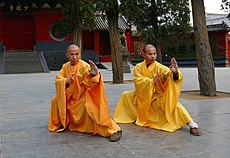Bafaquan
| Also known as | Eight Methods |
|---|---|
| Focus | Striking, weapons training |
| Country of origin | |
| Creator | Li De Mao |
| Parenthood | Fanziquan, San Huang Pao Chui, Tán Tuǐ, Tongbeiquan, Xingyiquan |
| Olympic sport | No |
| Part of a series on |
| Chinese martial arts (Wushu) |
|---|
 |
Ba Fa, or Eight Methods, is a Chinese martial art developed by Li De Mao (李德茂) during the Qing dynasty.[1] He combined the techniques of Fanziquan (翻子), Paochui (炮捶), Tantui (弹腿), Tongbeiquan (劈挂) and Xingyiquan (形意) into a new style based on the theory of eight methods (八法).[2][3] The eight methods are: outer trap, inner trap and stab, flick, support, shake, chop and reel. (攔、拿、扎、崩、托、抖、劈、纏) This style includes both single forms, pair training,[4] as well as weapon training such as spear, saber and sword. Eight Methods Big Spear (Da Qiang, 大枪), also known as the Big Pole, is a specialty of this style. This technique first appeared in 1906, just before the Revolution of 1911. It combines the methods of the Yue-family spear (岳家槍), Pear-flower Spear (梨花槍) and Liuhe Spear (六合槍) with principles of the eight methods. It is also designed to work on foot or on horseback.[5]
Ba Fa Quan is popular in regions such as Shanxi (山西), Datong (大同), Inner Mongolia (Nei Menggu 内蒙古) and Yuencheng City.[6]
References
[edit]- ^ Guido Sieverling (2015). Das Lexikon des Kämpfens: Begriffe und Erklärungen aus Kampfsport, Kampfkunst und Selbstverteidigung. BoD – Books on Demand. ISBN 978-38-370-3558-2.
- ^ Wu Shijun (武世俊),(2001), "Bafa Quan, Bafa Qiang" (八法拳·八法枪), 人民体育出版社, ISBN 7500920571
- ^ Wu Shijun (武世俊 ),(2006), "Bafa Quan", Guangzhou Beauty Culture Communication Co.Ltd, ASIN B000LP525C
- ^ Wu Shijun,(2006), "Pair Practice of Bafa Quan" (八法拳实战对练), Guangzhou Beauty Culture Communication Co.Ltd, ASIN B000LP523Y
- ^ Wu Shijun,(2006), "Eight Technique Big Spear and Its Combat Skills", Guangzhou Beauty Culture Communication Co.Ltd, ASIN B000LP5252
- ^ Wu Bin, Li xingdong and Yu Gongbao(1992), "Essentials of Chinese Wushu", Foreign Language Press, Beijin, ISBN 7-119-01477-3
